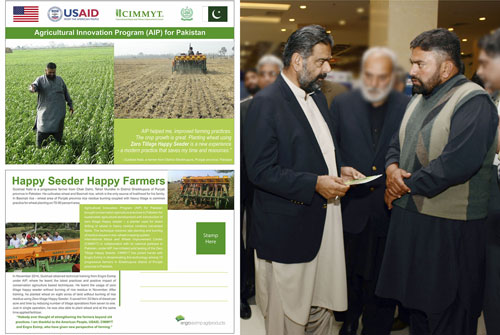Gulshad Nabi (Chand) is a progressive farmer from Chak Dahir, Tehsil Muridke in the Sheikhupura District of Punjab Province, Pakistan. He cultivates wheat and basmati rice, which constitute his family’s only source of livelihood. Heavy tillage and burning of rice residues are the common practices for growing wheat in the region, resulting in the loss of soil nutrients, air pollution and poor food security and livelihoods for farmers like Gulshad.

Photo: Amina Nasim Khan
The Agricultural Innovation Program (AIP), led by CIMMYT and funded by USAID, has begun testing with Punjab farmers the Zero-Tillage Happy Seeder, which sows wheat seed with fertilizer directly into the residues of the preceding rice crop in one pass and without tillage. “This practice offers a more sustainable and productive way to manage rice residues and raise wheat yields,” said Imtiaz Hussain, CIMMYT cropping systems agronomist. “It allows earlier sowing of wheat, which increases yields, and dramatically cuts the time, labor and fuel needed to plant wheat, which normally requires as many as seven tractor passes. Because the rice residues decompose on the soil rather than being burned, there is less pollution.”
In Sheikhupura District and in partnership with Engro EXIMP AgriProducts Private Limited, CIMMYT has promoted the seeder with 13 progressive farmers, including Nabi, who also received technical training in its use and in conservation agriculture practices and benefits.
After the training, Nabi used the seeder to sow wheat on just over three hectares without burning rice residues and saving more than 260 liters of diesel. At the Pakistan Agriculture Conference and Expo in Islamabad, Nabi described his experience to Mr. Sikandar Hayat Bosan, Federal Minister of Food Security & Research. “CIMMYT helped me improve my farming practices. The crop growth is great. Planting wheat with the Zero Tillage Happy Seeder is a new experience – a very modern practice that saves my time and resources,” said Nabi.
 Innovations
Innovations 
